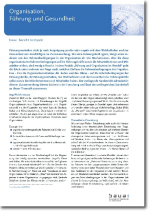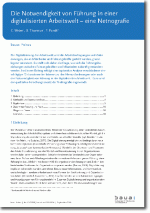Organisational frame conditions, working conditions, interactions and health of leaders and followers
- Project number: F 2436
- Institution: Federal Institute for Occupational Safety and Health (BAuA) / Kantar Deutschland GmbH
- Status: Completed Project
Description:
Leaders have a vital role to play enabling and supporting organisations adapt to emerging challenges in dynamic environments. However, it is not possible to accurately assess the ways leadership relates to and affects important parameters such as employees’ performance, health, and well-being without consideration of the organisational context conditions.
In the past too little research has been done on how organisational structures, the workplace climate, or an organisation’s culture affect leaders’ working conditions, how these conditions correlate with leaders’ actual conduct, and how this is ultimately related to the health, well-being, and effectiveness of employees and leaders alike.
The project at hand tackled these issues by generating and analysing information on all organisational levels (strategic, operational management, workforce) within organisations. Data were gathered by conducting an exploratory preliminary study based on the relevant research literature, secondary data analyses, and multilevel surveys of twenty-six organisations. Employees, their line managers, and senior executives were asked about their working conditions, the characteristics of their organisations, their attitudes to work, their well-being, and their health. Furthermore, the kinds of flexibility required by a dynamic world of work were explored by means of qualitative case studies that provided insights into the hallmarks of forward-looking organisations, their working conditions, and the emerging challenges of managers and leaders.
The following conclusions are among the project's key findings:
- The organisational climate (trust, participation, fairness, distributive justice, transparency, and communication) plays an important role as far as employees’ well-being and performance are concerned.
- There are significant interactions between leadership and organisational climate, especially at the team level (team climate, team leadership).
- Operational leaders shoulder particularly heavy burdens (e.g. work intensity, volume of work), and should be supported by the organisation. Hence, special attention should be paid to this particularly important group of employees in workplace health promotion initiatives and risk assessments.
- Dynamic environments require organisations to be highly adaptable and flexible. The implication is that organisational units and teams need to show a greater degree of self-organisation and take more responsibility for their own development. Trust, value orientation, and a new understanding of management and leadership are all necessary, if organisations are to follow this path successfully.
- The mindset and values espoused at the highest level of the organisation’s management are particularly crucial for its culture and a workplace climate that contributes to employee health. Management and leadership should be guided less by the principles of control and direction than by a supportive, enabling ethos.


